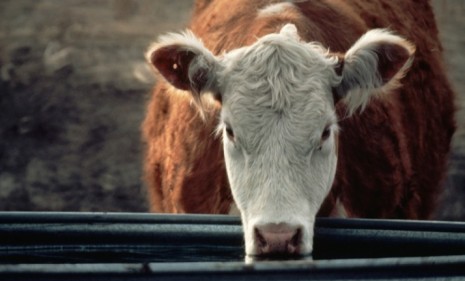Are cattle drinking themselves to death?
Cows often die during a drought, but in some cases it's not because the animals can't find water

A free daily email with the biggest news stories of the day – and the best features from TheWeek.com
You are now subscribed
Your newsletter sign-up was successful
The prolonged drought and intense heat gripping much of the United States has claimed many victims — 138 people have died so far this year from heat-related causes. The effect on agriculture has also been devastating, as crops wither in fields and livestock die from dehydration. Many ranchers, however, report that some cattle are dying not from lack of water, but from drinking too much of it. Here, a brief guide:
How can cattle die from drinking too much water?
When drought and heat waves strike, ranchers move thirsty cattle from dry pastures to places where stock tanks are full. Some of the animals drink too much water too quickly, resulting in water intoxication. Their balance of electrolytes like potassium and sodium gets diluted, and in severe cases the animals' sodium levels drop so low that they die from a condition called hyponatremia. "Once they fill up on water it happens pretty quickly," says Dr. Robert Sprowls of the Texas Veterinary Medical Diagnostic Laboratory, as quoted by the Associated Press.
The Week
Escape your echo chamber. Get the facts behind the news, plus analysis from multiple perspectives.

Sign up for The Week's Free Newsletters
From our morning news briefing to a weekly Good News Newsletter, get the best of The Week delivered directly to your inbox.
From our morning news briefing to a weekly Good News Newsletter, get the best of The Week delivered directly to your inbox.
Can this condition also strike humans?
Yes, hyponatremia often strikes people when they perspire heavily and drink large amounts of water. Athletes exercising in hot weather and people soaking in hot tubs are particularly susceptible. The condition has also been seen in young army recruits who "overhydrate" after training. Symptoms include confusion, disorientation, nausea, vomiting, and psychotic behavior. Sports drinks that contain electrolytes can help to prevent hyponatremia because they keep the body's store of electrolytes in balance.
Is too much water the only thing harming these cattle?
It's not just the amount of water they drink; the quality of water can also cause problems. Many stock tanks and other water supplies for livestock are contaminated with dangerous levels of nitrates, salt, and other pollutants. Water that's been stagnant for long periods of time can also be filled with toxic growths of algae, which can sicken or kill cattle.
A free daily email with the biggest news stories of the day – and the best features from TheWeek.com
Could the drought drive up beef prices?
It's very likely that they will. With grass pastures withering in the drought, feed prices climbing, and cattle dying off, many observers expect supermarket beef prices to rise this fall. "If you like steak and cheap, good ones, now is the time to eat them," says agricultural economist John Michael Riley in the Christian Science Monitor. "This the start of something that we could see for a number of years."
Sources: Accuweather, Associated Press, Christian Science Monitor, Journal of Clinical Pathology, NY Times